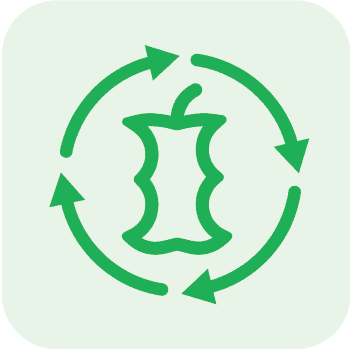Understanding Compostable Bags
Collecting your food scraps and sending them to a composter instead of the landfill is one of the most impactful things each of us can do to help the environment. Whether you’re just looking to get started, or you’ve been doing this for years already, selecting the right bag to collect your food scraps in is important for both you and your local composter. In this article, we’ll outline the easy way to identify a truly compostable bag, and we’ll break down all of the most common types of bags with their pros and cons.
Identifying Certified Compostable Bags
In the world of compostable products, the BPI certification is what you want to look for. This international certification means that the product and/or material has been independently lab tested and will break down in an appropriate amount of time with no contamination.
The Compost Manufacturing Alliance (CMA) is a newer certification that does stringent testing in an actual compost facility. Not every product that is compostable will have this certification, but those that do have taken the extra step to ensure that their products break down the way that they are supposed to.
Identifying “Green Washing”
Unfortunately, the environmental industry is filled with terminology that is meant to mislead the public into thinking that products are environmentally friendly when they may not be. Terms like “biodegradable” and “oxo-degradable” sound like they are the same as “compostable.” However, these products will not compost at a commercial compost facility and will need to be removed manually by the facility in order to avoid contaminating an entire batch of compost
Understand Your Options
When collecting food scraps and other organic materials, you have options. Your first choice is whether or not you want to use a bag at all. Choosing to not use a bag is perfectly acceptable as long as you’re committed to the cleaning that is required to keep the process sanitary. Without a bag in your kitchen or curbside bin, you will want clean your bins very regularly to prevent any remaining residue from rotting and becoming smelly. Also, in colder climates organic waste can freeze in your compost bin and make it impossible to empty. We always recommend using a high quality, certified compostable bag to make the process easy, clean, and smell free.
EcoSafe® Certified Compostable Bags
Made from compostable co-polymers, PBAT and PLA (derived from corn or other sugar generating plants like manioc), our bags are BPI and CMA certified compostable as well as extremely strong and resilient. The resin is made to be more resistant to mechanical stress and moisture. Due to this, our bags are strong enough to keep water in so you don’t have to worry about spills. When wet or hot food scraps are collected, the bag will remain strong with no leaks. In a compost facility, however, our bags break down just like the food scraps inside it. It will turn into nothing but water, a small amount of CO2 (this is produced by all food or products in the composting process), and humus (a nutrient-rich organic material).
These bags have a very similar chemical make-up to EcoSafe® bags except that they use a simplified and unrefined “corn-based” starch. “Corn-based” is in quotation marks because this is a bit of a misnomer – all compostable bags have a compostable polymer as their base, with a lesser percentage of a renewable resource such as starch or PLA making up the balance. These ‘corn-based’ alternatives contain starch, which has hydrophilic properties. The result is a bag that absorbs the moisture from your organic waste and will weaken, leak, and break much more easily.
Paper/Natural Fiber bags
Natural fiber bags do two things really well; compost and use sustainable materials. Where they fall short is in performance. These are usually in form of kraft paper bags that don’t work in bins (even when lined with compostable cellulose), and react very poorly to wet organics. In situations where their limitations can be accommodated, these bags live up to their environmental claims very well!
Oxo-degradable bags
Not accepted at compost facilities
When oxo-degradable bags break down, they become tiny fragments of plastic that will remain intact indefinitely. These fragments contaminate the compost with inedible toxins and render the end product unusable. These bags are not accepted at any commercial compost facility.
Biodegradable bags
Not accepted at compost facilities
Biodegradation is a natural process that every material on earth goes through, even plastic. The problem with this term is that it does not set a timeline for the product to degrade, and doesn’t account for what it degrades into. Unfortunately, this label has often been used in marketing to make environmentally harmful products appear friendly.
Plastic bags
Not accepted at compost facilities
Plastic bags are cheap, durable, and responsible for the environmental epidemic that is choking the earth’s oceans and environment. Many cities are banning these bags because of the horrible impact they are having on our way of life and the planet we occupy.
Food loss and waste occur at each stage of the supply chain. The biggest proportion (about 37%) happens in the home.
ReFED, 2021









I would like to purchase more of the 6400 compostable bags
Hi Paul! Feel free to re-order at your nearest retail location that carries our products. We are also on Amazon as well!
What is the thickness of your 13 and 55 gallon compostable bags?
Hi there! The thickness of our 13-gallon compostable bag is 0.60mL, the 55-gallon compostable bag is 0.85mL. Let us know if we can help you with anything else!
where are your ecopooch bags made?
Hi Pat, our EcoPooch bags are made in both Canada and China.
My understanding (2nd hand, related to UBC’s composting), is that ANY sort of “plastic” bag, even compostable, gets tangled in the auger, and that they then have to stop the operation and remove the tangled mess.
We (St. James’ House) use normal plastic bags and dump them out into the larger bins that UBC collects from our garbage room.
Comment, please.
Further to my comment: We actually promote using newspaper, folded into a gallon container with a lid, kept under the kitchen sink, and dumped every couple of days, paper and all, into the green bins in our Garbage Room.
Hi Doug, thank you for your comment. We’re getting in touch with the appropriate parties at UBC and will have them respond to your comments/questions directly. Our hope is that they can clear up any concerns you have very quickly.